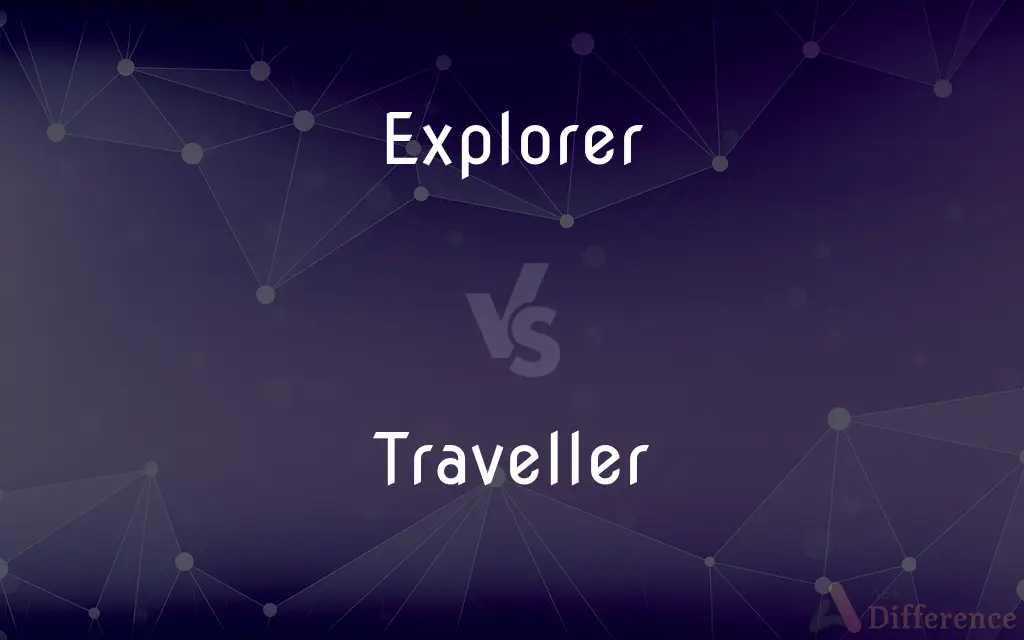Explorer vs. Traveller — What's the Difference?
Edited by Tayyaba Rehman — By Fiza Rafique — Updated on March 11, 2024
Explorers venture into unknown or less understood territories with the aim of discovery, while travellers journey to various locations primarily for experience or pleasure.

Difference Between Explorer and Traveller
Table of Contents
ADVERTISEMENT
Key Differences
Explorers are driven by the desire to discover new places, cultures, and geographical information, often venturing into uncharted territories or conducting research in areas that are not well understood. Their journeys are characterized by a sense of adventure and the pursuit of knowledge. Whereas travellers embark on journeys to experience different cultures, landscapes, and activities, with a focus on personal enrichment, relaxation, or adventure within already known or established destinations.
Explorers often face significant risks and challenges as they delve into remote, and sometimes dangerous, areas to uncover new knowledge or solve geographical mysteries. Their expeditions can require extensive preparation, including research, physical training, and securing funding. On the other hand, travellers may also prepare for their journeys, but their risks are generally lower, and their activities are more about personal enjoyment than about contributing to a broader understanding of the world.
The motivation behind explorers' journeys is primarily scientific, educational, or historical in nature. They aim to document their findings for the advancement of human knowledge, whether it's charting unmapped land, studying unique cultures, or collecting scientific data. Conversely, travellers are motivated by a wide range of personal reasons, including leisure, the pursuit of happiness, and the desire to escape the routine of daily life, rather than the goal of discovery.
Explorers often document their journeys meticulously, producing maps, reports, and records that can be of immense value to scientific and geographical communities. Their work can lead to significant discoveries that shape our understanding of the world. Travellers, while they may also document their journeys through photos, blogs, or journals, do so more for personal or social sharing purposes rather than for scientific or historical documentation.
The impact of explorers on the world is significant, often leading to new geographical knowledge, scientific discoveries, and even the opening of new trade routes or settlements. Whereas the impact of travellers is more personal or cultural, contributing to the global economy through tourism and fostering understanding and appreciation between different cultures.
ADVERTISEMENT
Comparison Chart
Purpose
Discovery of unknown territories and knowledge.
Personal experience and pleasure.
Motivation
Scientific, educational, historical.
Leisure, adventure, escape from routine.
Risks
High, due to remote and unknown areas.
Lower, typically within known or safe areas.
Documentation
Meticulous for scientific or historical value.
Personal, often shared socially.
Impact
Significant geographical or scientific findings.
Personal enrichment, cultural exchange.
Compare with Definitions
Explorer
Face significant risks.
Explorers often encounter dangerous wildlife and harsh climates.
Traveller
Generally safer experiences.
Travellers enjoy guided tours and well-trodden paths.
Explorer
Impact on human knowledge.
Explorers have historically opened new trade routes and civilizations.
Traveller
Journey for experience or pleasure.
As a traveller, she visited every continent to experience different cultures.
Explorer
Venture into uncharted territories.
She became an explorer to map the unknown parts of the Amazon.
Traveller
Document journeys personally.
She keeps a blog to share her travel stories with friends.
Explorer
Document findings for advancement.
The explorer's findings contributed to our understanding of ancient cultures.
Traveller
Motivated by personal enrichment.
Travelling helps him break from routine and find inspiration.
Explorer
Aim for discovery and knowledge.
His exploration led to the discovery of a new species.
Traveller
Contribute to cultural exchange.
Travellers bring back stories and foster global understanding.
Explorer
A person who explores a new or unfamiliar area
A polar explorer
Traveller
One who travels or has traveled, as to distant places.
Explorer
One that explores, especially one that explores a geographic area.
Traveller
A traveling salesperson.
Explorer
An implement or a tool used for exploring; a probe.
Traveller
A member of any of various groups of traditionally itinerant people living especially in Scotland and Ireland.
Explorer
One who explores something
Traveller
A metal ring that moves freely back and forth on a rope, rod, or spar.
Explorer
A person who by means of travel (notably an expedition) searches out new information.
Traveller
The rope, rod, or spar on which such a ring moves.
Explorer
Any of various hand tools, with sharp points, used in dentistry.
Traveller
A carriage that slides on a transverse track near the stern of a sailboat, providing an adjustable point of attachment for the mainsheet block.
Explorer
A visual representation of a file system etc. through which the user can navigate.
Traveller
One who travels, especially to distant lands.
Explorer
One who explores; also, an apparatus with which one explores, as a diving bell.
Traveller
(dated) A salesman who travels from place to place on behalf of a company.
Explorer
Someone who travels into little known regions (especially for some scientific purpose)
Traveller
(British) Someone who lives (particularly in the UK) in a caravan, bus or other vehicle rather than a fixed abode.
Traveller
(Ireland) Traveller
Traveller
A list and record of instructions that follows a part in a manufacturing process.
Traveller
(electrical engineering) One of the wires connecting the two members of a pair of three-way switches.
Traveller
(nautical) A metal ring that moves freely on part of a ship’s rigging.
Traveller
A rail or track for a sliding curtain.
Traveller
(bridge) A sheet of paper that is circulated with the board of cards, on which players record their scores.
Traveller
A styrofoam cup filled with liquor and usually ice, to be taken away from a place.
Traveller
A person who changes location
Common Curiosities
How do explorers impact society?
Explorers can significantly impact society by making new geographical discoveries, advancing scientific knowledge, and connecting cultures.
Are the risks faced by explorers and travellers the same?
No, explorers often face higher risks due to the nature of venturing into unknown or less understood areas.
What drives someone to become an explorer?
A desire for discovery, adventure, and contributing to human knowledge and understanding.
Can travellers also be considered explorers?
While there can be overlap, travellers typically seek personal experiences rather than discoveries for scientific or historical purposes.
How do explorers prepare for their journeys?
Preparation involves research, physical training, securing funding, and gathering necessary equipment and information.
How important is documentation for explorers?
Very important, as it provides valuable data and insights for scientific, historical, and educational purposes.
Can exploring be considered a form of travel?
Yes, exploring is a form of travel with a specific focus on discovery and adventure in new or unknown territories.
Why do people travel?
People travel for various reasons, including leisure, adventure, personal growth, and escaping daily life.
What role does tourism play for travellers?
Tourism provides the infrastructure and services that facilitate travellers' experiences and adventures.
How do travellers contribute to the local economy?
Through spending on accommodations, dining, tours, and souvenirs, travellers significantly contribute to the local economy.
What is the difference in preparation between explorers and travellers?
Explorers require more extensive preparation focused on safety and research objectives, whereas travellers prepare for personal comfort and enjoyment.
Can exploration lead to negative consequences?
Yes, exploration can sometimes lead to environmental damage, cultural disruption, or exploitation if not conducted responsibly.
Is the desire for exploration natural to humans?
Yes, curiosity and the desire to understand our world have driven exploration throughout human history.
What motivates travellers to document their journeys?
Motivations include sharing experiences with others, personal reflection, and preserving memories.
How do explorers and travellers impact the places they visit?
Explorers can bring to light previously unknown areas and cultures, while travellers support local economies and cultural exchange.
Share Your Discovery

Previous Comparison
Private vs. Discreet
Next Comparison
Analysis vs. AlgebraAuthor Spotlight
Written by
Fiza RafiqueFiza Rafique is a skilled content writer at AskDifference.com, where she meticulously refines and enhances written pieces. Drawing from her vast editorial expertise, Fiza ensures clarity, accuracy, and precision in every article. Passionate about language, she continually seeks to elevate the quality of content for readers worldwide.
Edited by
Tayyaba RehmanTayyaba Rehman is a distinguished writer, currently serving as a primary contributor to askdifference.com. As a researcher in semantics and etymology, Tayyaba's passion for the complexity of languages and their distinctions has found a perfect home on the platform. Tayyaba delves into the intricacies of language, distinguishing between commonly confused words and phrases, thereby providing clarity for readers worldwide.
















































